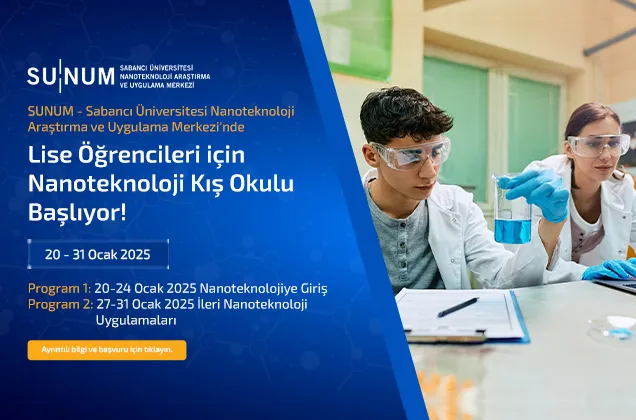25/05/2014

Wednesday talks with Nesrin Balkan
Ayşe Kadıoğlu: I love lecturing; it gives me energy. I have been attending lectures with the same enthusiasm since 1984. I have been practically living in universities for so many years, but I still feel the excitement of the first day of classes, when all the students arrive. I still believe universities belong to their students.
This week’s guest Ayşe Kadıoğlu has been a member of Sabancı University faculty since 1998, and the Dean of the Faculty of Arts and Social Sciences since September 2013. I also think she is one of the people most associated with Sabancı University, to the extent that her face is among those that I visualize when I think of Sabancı University.
Her hands –gentle, elegant and feminine hands– were among those that laid the foundational bricks of our university 15 years ago. I asked about Ayşe to her colleagues, looked up on what her students had written about her. They all say the same things. According to her close colleagues, she is subdued, persuasive, a good listener and an easy person to work with. In this week’s part, I spoke with Ayşe Kadıoğlu on her years as a student, her professors, her students and lecturing today, and motherhood. Next week’s part will be on an entirely different subject.

Your students love you. I have read only positive comments about you. Let’s start from there.
Fine, let’s start with student relationships. I gave my first lecture in 1984 as a teaching assistant to a University of Boston course similar to our SPS 101-102, which had about 400 students. I still remember how I had gone beyond myself and prepared for half a day for my first discussion course, which was only an hour long. Giving lectures has always been important to me; it’s never been something I do on the side while I do research. I love lecturing; it gives me energy. I have been attending lectures with the same enthusiasm since 1984. I have been practically living in universities for so many years, but I still feel the excitement of the first day of classes, when all the students arrive. I still believe universities belong to their students.

So you have been a lecturer for 30 years. You certainly don’t look like it.
Yes, I have been a lecturer for 30 years but I still go over what I will do before every class, even if for a few minutes. Of course I know the topic I will cover in class, but I always consult my notes before I go into the lecture hall. Having said that, most of the stuff is available online now, so I don’t carry around a bulk of notes when I attend a lecture. I take it upon myself to explain a difficult subject in a simple way. I always pay attention to that when giving a lecture. I will not succumb to the complexity and difficulty of a subject and teach it in the same complex and difficult manner; I will find a way to teach it more straightforwardly.
You like a crowded lecture.
Yes, I enjoy the dynamics there. I can’t get bored when I’m giving a lecture, or the lecture would be of no use to the student. I must feel passionate about the subject I teach. So I try to shape the lecture in a way that will keep me alert. I look into the eyes of my students, we share a laugh during the class, there have even been times I cracked up in laughter.
Yes, one of your students wrote about this in Ekşi Sözlük.
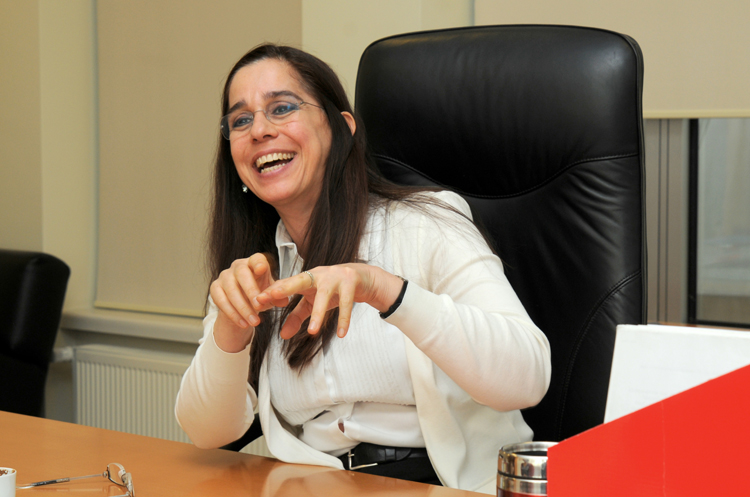
There are times we laugh so much that our eyes water. That is the dynamics of a lecture. I am so keen to give lectures that, during my PhD, I joined a program where we would give lectures to the inmates of a local penitentiary. One of my fellow PhD students was giving lectures there, and I had joined as a visiting professor. It was an interesting experience, they had even taken my hairclip from me as I entered. That is when the gravity of the situation struck me. About 400 male inmates were pacing in the courtyard. I was worried if I was doing the right thing. My friend noticed how nervous I was, and told me not to worry because even if someone was to give me verbal abuse, ten others would stop him from doing that, that the program was precious to them and they would make sure the program doesn’t get cancelled because of some petty trouble. I really had no issues. Everyone had done the required reading. I’d never seen a class like that in my life. The course was on political economy and I taught Karl Marx. The early period of Marx was one of my minor specialties in my PhD in Political Thought. So I taught Marx in a prison.
A prison in America, above all.
Yes, I taught Marx in an American prison.
Another student on Ekşi Sözlük says “the professor whose lectures I go to most regularly because she doesn’t take attendance” about you.
Yes, I tell my students beforehand that they best come to class because I teach hard subjects in an easy way. “It will be difficult if you just try to read the book and borrow notes from another student; I will make your life easier” is what I say.
Is this your first time as a dean?
Yes, first time.
What do you think about it?
Like everything, I wouldn’t be able to do it if I weren’t passionate about it. I took this position not to manage an established structure in monotony, but with the hope that something new can be done. These can be new programs or improvements in existing ones. I promised myself that I would not torment myself for not having read or written a single paper for the first semester, and that I would try to understand this job as a whole. I allowed myself to take a semester off from my academic endeavors. I came to the office every day and tried to understand how things worked. I also made an oath not to complain for at least one year.
No complaining for a year should give you peace of mind.
I try to understand things before complaining about them. I try to have a positive attitude. There will be negative days, of course. But I will not surrender to negativity.
I have known you for 15 years, and have always seen you calm, smiling and positive – with one exception: years ago, during an international event, you were extremely tense and nervous. I think something had gone wrong. You were muttering to yourself, but in English. I remember you even spoke to me in English.
It’s entirely possible I did. I run through rough patches like everyone else. These last two months, I lost two of my friends. Losing a loved one is devastating. Both had been ill for a long time, but it is shattering nevertheless. About the smiling face, I think I inherited my positivity from my mother. She is 84 years old now, and she still cheers me up when we talk on the phone. When I feel a bit down, I go to Ankara to visit my parents. It should be me who helps their energy along now, but my mom and dad still give me a boost. My mom learned how to go online at 84 just to keep in touch with me, my brother and her grandchildren. We talk on Skype now.
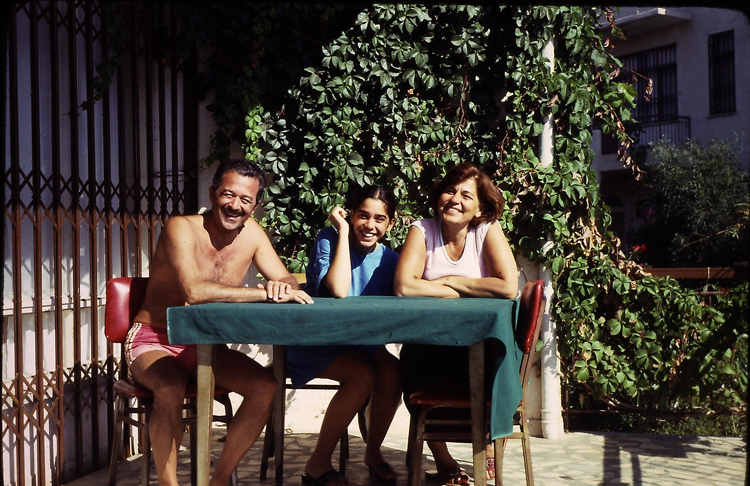
Your mother is quite admirable and a great example.
She is an amazing woman, yes. She is a medical doctor. I think I owe my positive energy to her.
So you have been in Sabancı since 1998, for 16 years.
Yes, I have been here since the beginning. Sabancı University grew up right before my eyes, so I feel great attachment. After returning from the United States, I worked at Bilkent University for seven years. My alma mater is Middle East Technical, on the other hand. I graduated from METU in 1982. I was a student there between 1978 and 1982, punctuated by the military coup in 1980.
It must have been a great divide.
The university was rife with political tension those days. We would be frisked every morning as we arrived on campus. I was in the Political Studies department and that alone was a problem. The military police would get spooked because my student ID had something “political” on it; I would have to explain every time that it was the department I studied in. I think this plagued political science students in all universities because politics itself was a suspect back then.
The word “political” was a taboo.
Politics as a concept was highly suspicious. Some of our textbooks proved to be troublesome as well; we left them at home so that we wouldn’t have to carry them around. They would make us put our hands on cars and search us from top to bottom. We couldn’t hear the voice of the professor over the racket of the armored vehicles in the campus. It was a crazy period. Afterwards, I went to the University of Chicago for my graduate degree.
Suddenly it was a different world.
And it wasn’t any American university. Chicago’s liberal environment was unlike other schools back in the day, and there was even a Chicago school in Economics because of that. There, I was introduced to an academic literature that was vastly different. I learned a lot during my two years in graduate education. I had distinguished professors. The two years in Chicago were very important in my life. After a short break, I moved to Boston and started my PhD at the University of Boston. Then, I returned home to Bilkent. I lived in Boston for seven years, in Chicago for two years before that. So I spent the 80s in America.
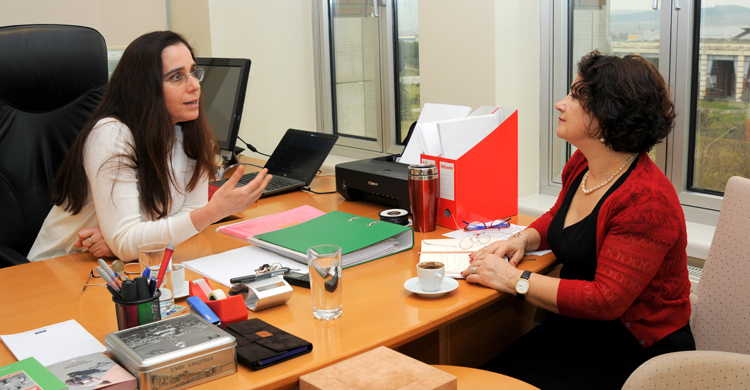
Chicago and Boston played a large part in your career, obviously.
I had two advisors in Boston; one of them was in Middle Eastern Studies and the other in European Studies. I went back and forth between the two. I studied migration in Europe for my PhD. My primary advisor was the Middle Eastern Studies professor. She taught me how to merge politics and academics. She had a profound sense of justice, had always been politically involved, and was a prolific scholar who made great contributions to literature. There is an opinion that a good academic will stay out of politics. She showed me that this was not true. So I have been writing in newspapers during my academic career. I have been writing since 2000, and there was a time when I was writing weekly.
Yes, you were a regular contributor.
I was writing in the Radikal 2 supplement. In 2006, I published a collection of my articles printed there. I have learned about civic involvement and keeping in touch with the community from my advisor Irene Gendzier. Of course, Edward Said was the most important person to merge politics with academics. Said had a great influence on my vision. My other advisor, the European Studies scholar Andrei Markovits, taught me how to teach. When I was his assistant, I attended every lecture with him and graded his exams. I was greatly influenced by his style at an early age as I watched him and listened to him. He was an astonishing professor and a great teacher. He would have the attention of every student in the huge lecture hall. I think he also taught me professionalism. My two advisors in Boston taught me a lot. I also had legendary professors like Howard Zinn. I wrote an obituary about Howard Zinn when he died four years ago.
You had many distinguished professors who influenced your career and your life in a profound way.
Indeed; Howard Zinn was another great influence. I was his assistant as well. He had once invited the surviving members of the Abraham Lincoln Brigade, who had fought in the Spanish Civil War. That was the craziest lecture I had ever seen. These people had left America and traveled to Spain to join the civil war in 1937. Hemingway had joined the war as well. Howard Zinn was politically very active. He would give political lectures in addition to his courses. He is the author of A People's History of the United States, which discusses civil movements throughout US history. The conventional approach to US history dwells on institutions, such as how the parliament and congress was established, how the presidential system evolved. Zinn, on the other hand, wrote the history of social struggle in America.

That is a great perspective.
It is now a high school textbook in America. It is a very important book and he had signed me a copy, which is very precious to me. I hadn’t realized the significance of the book when he first gave it to me. He had simply said, “Perhaps you’ll read it one day.” I had thanked him out of courtesy, but I wasn’t aware that I was holding a treasure in my hands – one that was autographed by him, nothing less. Anyway, that’s my Boston story.
How about your academic work?
I am passionate about women’s studies. Speaking about my advisors; they were my professors and my mentors, but you also have your heroes in life. I have always been inclined towards studies focused on heroines. In Turkey, İpek Çalışlar has been doing this for years. She wrote the book on novelist Halide Edip Adıvar and on Atatürk’s wife, Latife Uşakizade. Yaprak Zihnioğlu has a great book on women’s rights activist Nezihe Muhiddin, which I use in my course. I have always tried to keep heroines on the front line and include them in my lectures. As for my heroines, there is Lilith. According to some, Lilith predates Eve.
I hadn’t heard of Lilith.
She is a woman who disregards advice and does as she pleases. Eve is a spouse; she is Adam’s wife. But Lilith is an independent woman.
Which faith does Lilith belong to?
Lilith is mentioned in the Jewish apocryphal text called Alphabet of Sirach. In Ancient Greece, there is Hipparchia, who is a Cynic philosopher. She is an important figure as well. In the modern age, I find Mary Wollstonecraft very important. Mary Wollstonecraft published A Vindication of the Rights of Woman in 1792. She had an affair with William Godwin, who was known as a liberal anarchist at the time, and they had a daughter. She had had another daughter before Godwin. She was condemned by the society because she conceived out of wedlock. Her daughter from Godwin was Mary Shelley, the author of Frankenstein.
Yes, she wrote Frankenstein.
Mary Wollstonecraft died shortly after Mary Shelley was born. Wollstonecraft was far ahead of the period she lived in, because of which she was at great discord with the times and suffered mental issues. The same goes for Nezihe Muhiddin. She was far ahead of her time and she voiced issues and values that were rejected by the society of the time. Yaprak Zihnioğlu’s book on Nezihe Muhiddin has a very sad ending; Nezihe Muhiddin dies in the La Paix mental hospital in Istanbul.
Wollstonecraft’s daughter Mary Shelley went on to write Frankenstein. In one article, I had argued that since Mary Shelley’s mother dies during birth, Frankenstein is her ruminations on motherhood. I think Frankenstein is about being a mother. For some, being a mother is giving birth; people talk about how they carried their child for nine months. I think it has nothing to do with that. As a biological mother who has given birth, I can say that motherhood actually begins after birth. That is how I had interpreted Frankenstein. Dr. Frankenstein gives his creation life, but he doesn’t train him, doesn’t teach him anything, and his creation turns into a monster. It’s not enough just to give birth; you must put effort into your child, you must raise him.
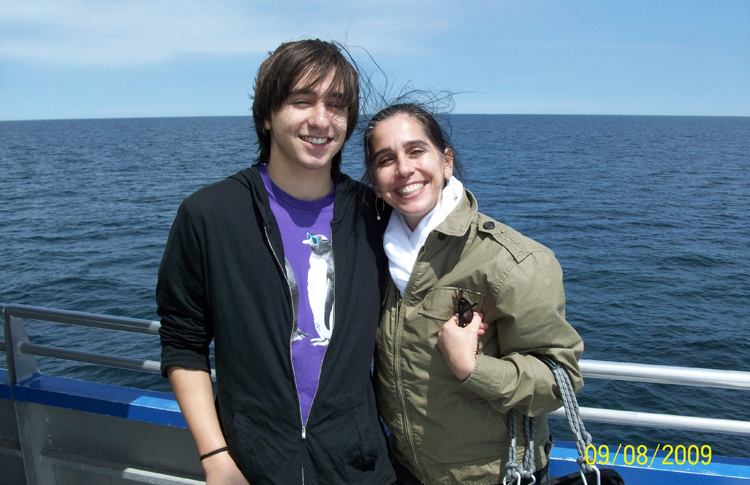
An important point.
Parenthood begins after birth; it has to do with what you do for your child. That is how I see it. I am crazy about my son. If you asked me what I was, my first response would be “mother.”
Then a professor, and then a political scientist.
I think those two go in tandem.
To be continued…





